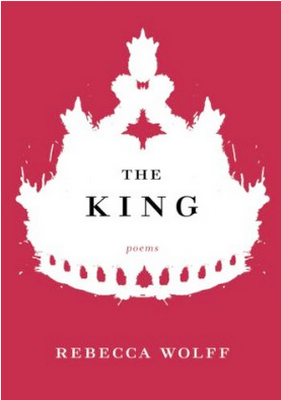The King: Poems

I’m trying not to look at Rebecca Wolff’s new book of poems, The King, as a self-help book, which, of course, it’s not at all. But as a fellow writer and mother whose venture into the latter ’hood punted me way out of my cozy work-life comfort zone, I can’t help but look for clues and compare notes while reading Wolff’s crystallizing poems. After all, she’s got it together enough to write books.
In The King, Wolff begins with poems on the fragmented physical and emotional, or perhaps biological and psychological, experiences of pregnancy. “Creative Visualization” suggests thoughts appearing in a prenatal yoga student’s consciousness, while printed on the facing page is “Poem on Colostrum,” which both explains and wonders at the pre–breast milk excretion. The next group of poems, the first of two sections called “The Baby,” begins so matter-of-factly, so succinctly—“it was inevitable—/I was pregnant”—that a spiral into darker territory seems inevitable. In “The Letdown,” Wolff elicits fury at the twisted powers every mother is granted:
and writhing
I wiped that smile
right off your face
and by withholding
the milk from my breast
make a man out of you
and with my raving
I wouldn’t wish this
on anyone
not even a mother
Today, we’re constantly reminded that motherhood is a choice. One can have a complete existence without it, and thus if it is chosen (of course, there are still lots and lots of women for whom it isn’t), it can feel all the more disruptive. At times, the child and mother-becoming are viewed as biological oddities, and I imagine that maybe Wolff sometimes looks, as I do, across the dining room table at her children and wonders “Who are those beings? What happened to make them come here? Why, oh why, are they under my watch?”
In the section titled “The Man,” the narrator seems to be redefining herself as an adult individual, perhaps having been changed by the child, unmentioned but inextricable: “You must look into his eyes/as though you really knew him.” The final section, “Depth Essay,” is like an apotheosis, the narrator having settled in, somewhat (do we ever really settle in to this?) to life punctuated by therapy, childhood illnesses, the unease of the narrator’s own youth ever-receding in the distance, and homemade cookies.
The middle section, which gives the book its title, seems to explore the key (I’m going to try it, at least) to achieving this appearance of semi-balance. The first and last lines of “Content is King”: “I queen it/over emptiness./...The king is content.”